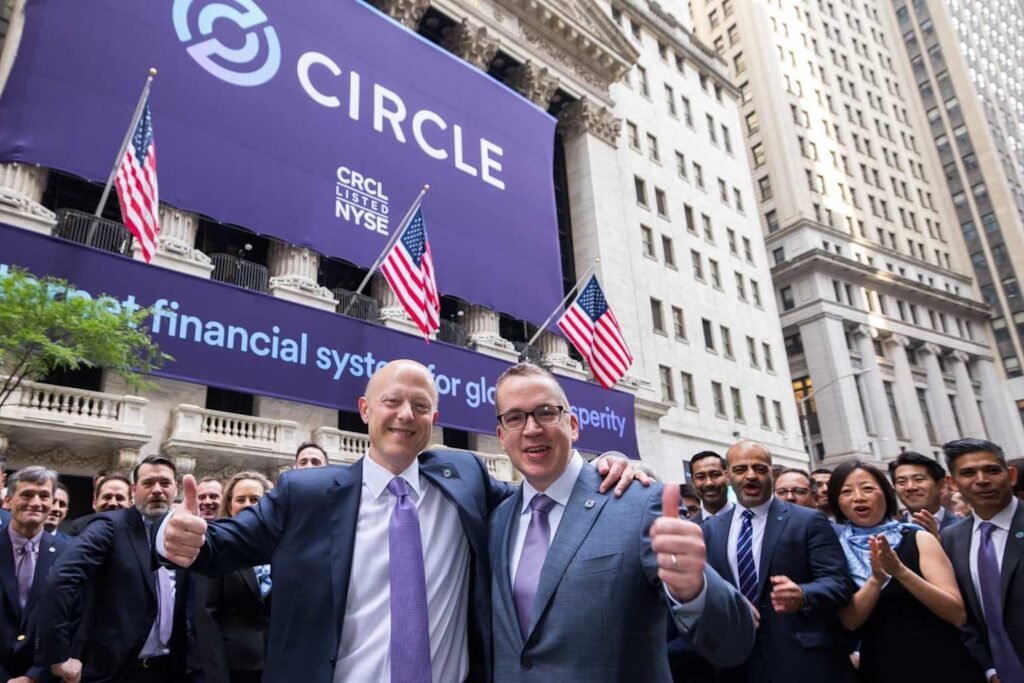I have not been a supporter of Stablecoin due to lack of safety and regulatory provisions in the same vein as regulated Banks. The Genius (really ??) Act changes that and provides for regulatory provisions similar ~ to that which governs other financial entities, including maintenance of capital requirements and money laundering protection. The AML provisions are weak and will not capture small medium bad actors.
Time will tell and I really hope that under Carney we will see some movement in Canadian finance. since we end to miss innovation completely in Canadian Banking and Finance. Similarly I hope OSFI are taking note.
_______________________________________
Source Perplexity.ai
Circle, Coinbase surge after Senate passes stablecoin GENIUS Act
Shares of Circle Internet Group and Coinbase surged significantly after the U.S. Senate passed the GENIUS Act, a landmark bill establishing the first federal framework for stablecoin regulation, with Circle stock rallying nearly 20% and Coinbase climbing 11% as investors responded positively to potential mainstream adoption of dollar-pegged cryptocurrencies.
cnbc.com
GENIUS Act Key Provisions
The GENIUS Act establishes comprehensive regulations for stablecoin issuers with several critical provisions:
Requires issuers to maintain 100% reserves backed by cash or high-quality liquid assets like U.S. Treasury securities to ensure 1:1 backing
Limits stablecoin issuance to authorized entities including insured banks, credit unions, and federally-qualified or state-qualified issuers
Mandates monthly audits and transparent redemption processes for consumer protection
Prohibits yield-bearing payment stablecoins to prevent evasion of the legislation’s intent
Establishes that stablecoins meeting the criteria are explicitly defined as non-securities, preventing SEC jurisdiction
Requires compliance with anti-money laundering laws and anti-terrorism sanctions
Grants stablecoin holders priority for repayment in the event of issuer bankruptcy
This regulatory framework aims to integrate stablecoins into the U.S. financial infrastructure while providing the clarity that financial institutions need to confidently adopt these digital assets for payments and settlements.
Circle’s 400% Stock Surge
Circle Internet Group (CRCL) shares have experienced a meteoric rise since their June 5 IPO, surging approximately 400% from the initial $31 per share price to reach as high as $176 following the Senate’s passage of the GENIUS Act. The stablecoin issuer’s stock debuted with a spectacular 168% first-day gain, opening at $69 and closing at $83.23, marking the biggest Day 1 pop since Arm’s 2021 IPO.
The remarkable performance has been fueled by several factors:
Growing mainstream acceptance of stablecoins as financial infrastructure
BlackRock’s interest in acquiring nearly 10% of Circle’s shares
Strong financial results with 59% revenue growth and 75% net income growth in Q1
Regulatory tailwinds from the Trump administration’s crypto-friendly framework
USDC’s position as the second-largest stablecoin with billions in circulation
Increased trading volumes as investor confidence surged after the Senate vote
Stablecoin Reserve Requirements
The GENIUS Act establishes strict reserve requirements as the cornerstone of stablecoin regulation, requiring issuers to maintain a 1:1 backing ratio between stablecoins and reserve assets. These reserves must consist exclusively of highly liquid assets including:
U.S. dollars and coins
Government money market funds
U.S. Treasury securities
Other cash-like instruments with minimal risk
Issuers must publish monthly reserve disclosures and comply with anti-money laundering regulations, with larger issuers (exceeding $50 billion in market capitalization) required to provide annual audited financial statements. The legislation also creates a bankruptcy protection mechanism, ensuring stablecoin holders receive priority claims on reserve assets if an issuer fails, providing crucial consumer safeguards while maintaining the dollar’s supremacy as the world’s reserve currency.

